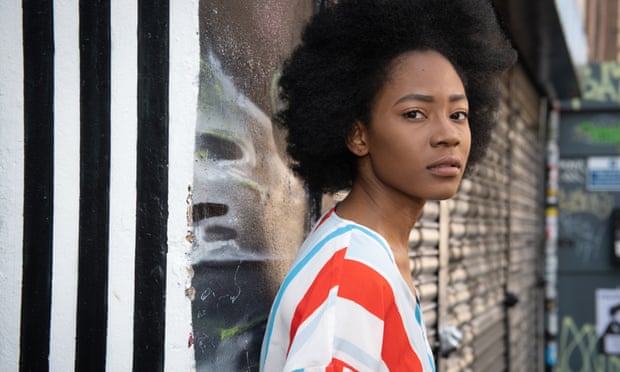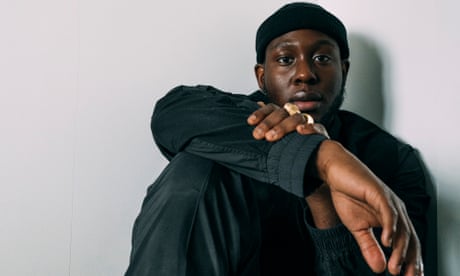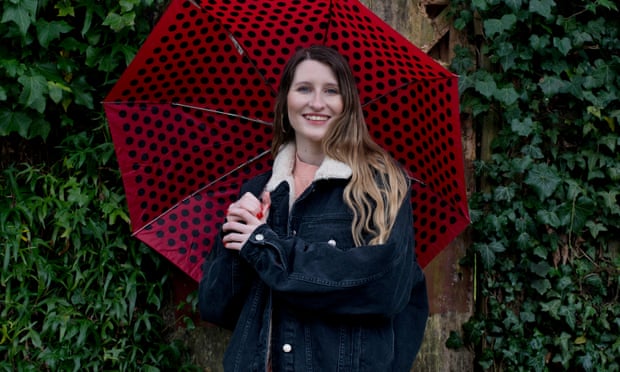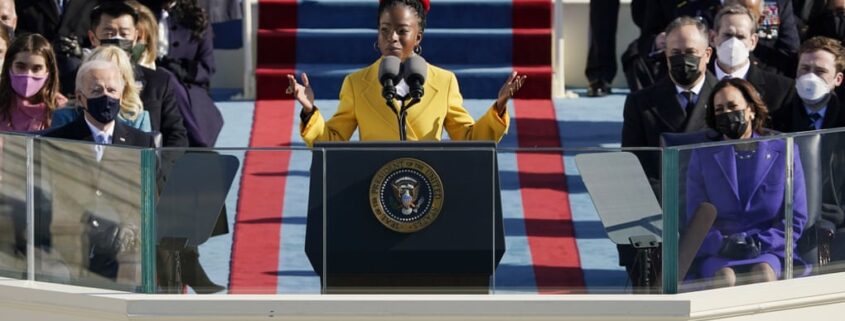YOUNG PEOPLE IN PERSUIT OF POETRY
YOUNG PEOPLE IN PERSUIT OF POETRY
by Norman Warwick
After America’s youth poet laureate’s ‘mesmerising’ inauguration reading, Cecilia Knapp, Caleb Femi and others who have benefitted from the work in the UK by Spread The Word and others in the UK, spoke to Alison Flood and Sian Cain of The Guardian to reflect on how poetry can empower young people.

´I came to poetry by accident, through a workshop at Camden’s Roundhouse,´ á Young People´s Laureate, Cecilia Knapp recalled. ´I was 18 at the time, had no money, and was living alone in London. Poetry had not been in my life before. I was awful when I started. But I was so thirsty to get better.
I’m working on my first collection now. I lost my mum at a young age, so a lot of the collection looks at how that might impact a young woman. And I lost my older brother to suicide in 2012. He had a long battle with addiction, and also his sexuality, and I was a carer for him for a really long time. A lot of the poems in the book that I’m working on are looking at his life. I’ve always used writing as a way to figure things out: not necessarily to find answers, more to ask questions about them.
When young people see a poem or film on YouTube or social media, it gets rid of that preconception that poetry has to be this isolated, solitary act of opening a book and reading something old fashioned. I love reading poetry myself, and I believe that young people can, too, but they can also love spoken word or performance poetry, poetry on film or poetry with music.
I’ve worked with young people for almost a decade now, and I’ve experienced first-hand the impact poetry can have on them – something happens when you let yourself be free and creative, it is magic. It’s really empowering for young people to be told that what they have to say is important and valid. We need young voices contributing to the canon, because they usually reflect what’s really going on in the world a lot of the time.
Someone who I use as a springboard for young people is Danez Smith, a non-binary African American poet who talks a lot about race, class, sexuality and gender in the collections Don’t Call Us Dead and Homie.
Roger Robinson’s book A Portable Paradise responded so amazingly to the injustice of Grenfell, as did Jay Bernard’s book Surge. There are so many amazing writers at the moment.”

Theresa Lola a Laureate in 2019 said ´I always loved writing, I just wanted to tell stories. Then when I was about 13, living in Nigeria, I went on a school trip to a poetry festival and it became poetry that I wanted to write.
The laureateship was one of those emails you get that you’re like, “what?” I knew my focus was going to be well-being. The epidemic has exacerbated this, but at the time there was a lot of focus on the mental health crisis among young people and I wanted to address that – and to write about our joys, too: the things that bring us happiness. I did teaching residencies, including ones on hope at St Paul’s Cathedral, and one aimed at young women about mental health and body image at Bethlem Museum of the Mind in Beckenham.
Poetry has this wonderful gift of allowing us to be imaginative and allowing us to articulate even the most complex feelings. And there’s a power in that, especially when you’re writing about things that make you feel powerless. There is a power in having your own voice, and having some sort of control of how you share that story.
To have poetry make national headlines after Joe Biden’s inauguration was just so exciting. Let’s be honest, that particular inauguration was one like no other, so to have Amanda Gorman’s poem being able to articulate everyone’s feelings, the feelings of the past, the present and the future – that was just the perfect example of what poetry can do.´
Caleb Femi (below) was similarly enthused.

´When I was offered the laureateship, (in 2016I had just left teaching and had no idea what I was going to do for work. I just knew that I wanted to be a writer, and I wanted to engage with young people in a way that was a lot freer than the confines of the curriculum. When the gig was offered to me, I was ecstatic.
Sometimes when you mention poetry to the general public they wince, because people haven’t had the best experience in school, whether it was the way that it was taught, or the content not being widely reflective of the human experience. So I wanted to contribute to a rehabilitation of poetry. It was also about putting young people at the forefront of everything. I was particularly interested in looking at the outer boroughs of London, because I feel, in terms of engagement with the arts, those are the areas that are usually the most disenfranchised and overlooked. So I went to many schools and asked young people: What do you want? Then we were able to set up workshops, programmes, spaces where they could perform and gather, all while knowing ultimately that it was what they wanted, not something we were bringing in as a cavalry that thinks they know how to do everything.
For me, what poetry affords you is a chance to interrogate how you feel about yourself, your insecurities, fears, wonders, happiness. It allows you to articulate that, and by doing so, you’re able to fully understand it. This is very important as a young person, as you can find your tribe that way. It also allows you to empathise and understand somebody else’s experience. I think it really enriches you as a human being´.

photograph by Sarah Lee / The Guardian
Selina Nwulu, a laureate of 2015 explained that ´a lot of what I do within the poetry world is thinking about the role of art and poetry within conversations around social change. It’s no coincidence that the popularity of poetry has risen in recent years, with the way things have been going politically.
I’m the youngest in a large family, so I was often encouraged to write poetry as a way to distract me for a bit. In school I didn’t really gravitate towards it, and my writing was almost like a diary entry, never anything I imagined that I would share, just a way of processing things.
I started doing open mics, and it grew from there. It was never anything I would have expected, but once I was there I rode the wave.
As laureate, I wanted to be an ambassador for what poetry could be. Part of what I was doing was encouraging young people to write about what they care about, but also it was me doing that by example.
I write to understand the sweet spot between the personal and the political, how to talk about something difficult in a way that is engaging. My motivation is to talk about politics, race, climate change, the social injustices that surround us, but in a way that is beautiful and personal. That’s how you disarm the reader.
When I started, it was very important for me to be known as a political poet. Now I’m seeing the politics in everything. Amanda Gorman is an incredible example of the power of both poetry and activism. Seeing her standing on one of the highest, most prestigious stages showing what poetry can do was really interesting to see. She is a poet, but she’s also using poetry as a message to talk about bigger issues.”

photograph by Sophia Evans / The Observer
Áisling Fahey recounted how she has had ´a very enriching experience with poetry over the years. But my breakthrough moment came when I was 13, when I entered a competition via school. Through that, I was really lucky to meet poets like Jacob Sam-La Rose, Malika Booker and Nick Makoha. For the first time, I was listening to living, breathing poets telling their stories. I saw the effect they had on their audiences. Poetry became something with power and purpose. That was it for me.
It was so exciting to be asked to be a laureate. There were lots of pinch-yourself moments. I was able to travel. I went to literature festivals. I ran workshops for people across the globe. I wanted to challenge people’s perceptions of poetry. Everyone has different connotations of who poetry is for, and how they should approach it. I wanted to broaden people’s idea of what a poem is, can be and can do. One thing that struck me was how every single person, old or young, had a story to share, but so many had never been asked to before.
Amanda Gorman’s performance was completely mesmerising. I watched it live and she transported me with her words. She really connected with people across the world – she shone! People turn to poetry in moments of high emotion: a birth, a celebration, a tragedy. We often see poems go viral because they have captured people’s thoughts. But any viral poem is just the tip of the iceberg. In the UK, we have so many great young poets just coming up, and so many poets who have been working for years. I devoured Rachel Long’s My Darling from the Lions, and am currently reading The Air Year by Caroline Bird. I often return to Eavan Boland, including Outside History and A Woman Without A Country. It’s wonderful when you see signs that more collections are being sold or getting published, that there’s a need for poetry from the public. The talent is there – it’s just up to people to discover it.´





Leave a Reply
Want to join the discussion?Feel free to contribute!